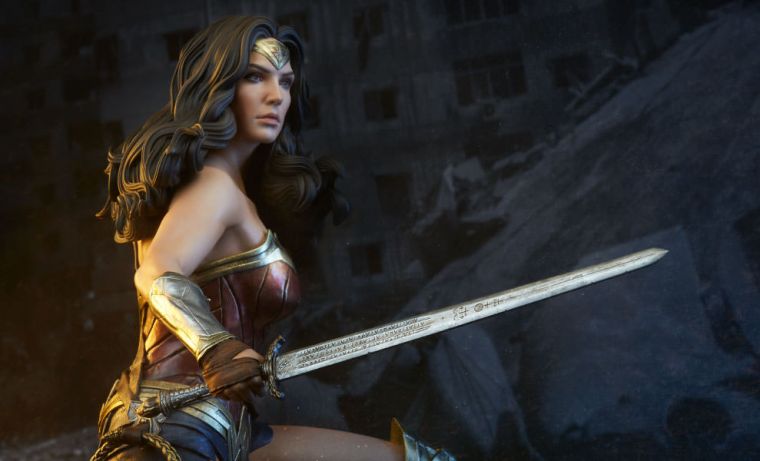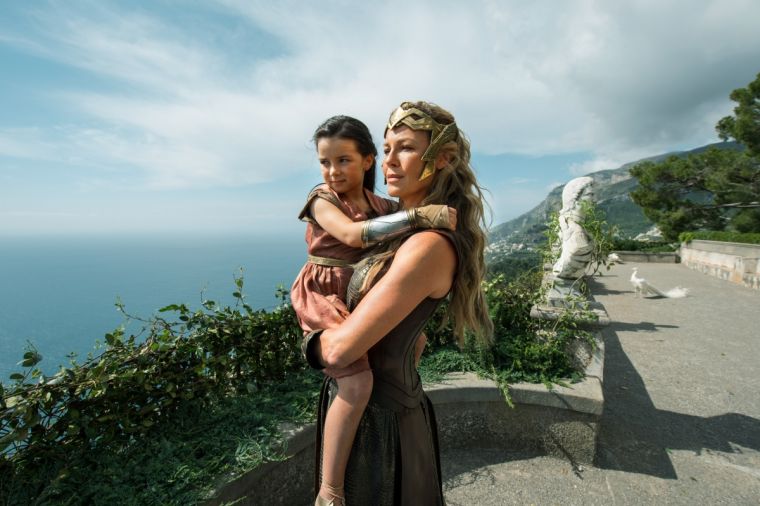Wonder Woman's unexpected theme: Amazing Grace

The secret is already out – after several false starts, DC Studios have finally worked out how to make a superhero movie. Wonder Woman is, perhaps unexpectedly, a really brilliant addition to the genre, and one which plays on its central reversal of convention to great effect. As you might also have heard, small outpourings of uproar have been caused by female-only showings of the film in the US, and a perceived feminist agenda, but frankly it's high time that a high-quality superhero film put a woman at the centre. This isn't a repeat of 2005's naff Elektra, or even of last year's strangely tokenistic Ghostbusters reboot. This is the film that finally gives girls a hero who stands shoulder to shoulder with Batman, Superman, and the legions of other caped male crime-fighters.
To reduce the film merely to a marker of progress however, is to undersell it. Gal Gadot – who lit up DC's otherwise-forgettable Batman vs Superman last year with an extended cameo – is excellent as the genuinely-heroic Diana, the wide-eyed but well-read Amazon warrior who willingly charges into the front lines of World War One. Chris Pine, as Steve the American spy who crash-lands on Diana's secret island and draws her into the conflict tearing up the world beyond it, is pretty good too. It's a welcome break from formulaic superhero plots, and like Captain America: The First Avenger before it, uses a wartime setting to create satisfying opportunities for heroism and personal sacrifice. One pivotal scene, as Diana charges head first into No Man's Land with only her bullet-repelling arm-guards to protect her, is surprisingly rousing, and a moment where you realise that director Patty Jenkins has absolutely nailed the genre.
It's also a film with some fairly significant theological themes. Raised on an island entirely populated by warrior women, Diana's experience of the 'world of men' is both eye-opening and depressing. Having lived in a sort of Eden-esque utopia (albeit one with an awful lot of sword practice) Diana steps outside her bubble and begins in the to understand the presence of 'sin' in the world. At first, she holds on to her belief that the human drive to cause pain and suffering is driven by Aries, the God of War, controlling and driving evil forward. But as she's drawn into the battle, she begins to realise that he's simply hovering in the background like CS Lewis' old demon Screwtape, whispering incitements into the ears of the susceptible. Finally, she learns that the decision to respond to evil is a personal one, made in the heart of every person.
Even more pertinently for Christian viewers, she and the film go even further than that, by talking about the possibility of redemption. Though various characters commit awful crimes across the war, Diana does not condemn them, but rather speaks of a choice to embrace salvation through belief. In perhaps the film's key line, she does a pretty good job of unpacking God's Grace when she says: 'It's not about what you deserve, it's about what you believe... and I believe in love.' For Diana, the choice to believe in the power of love to overcome hatred, light to beat darkness, is the thing that saves and justifies a person – even one who has 'sinned'. It's not a perfect illustration of salvation through Christ, but it's pretty close, and ensures that Wonder Woman clips will be peppering sermons around the world for years to come.

Despite its excellent central pairing and unexpected thematic depth, Wonder Woman does have a few problems. The wartime setting is an encouraging departure from the usual big city backdrop of recent superhero movies, but disappointingly the writers couldn't find a finale that didn't end up in the usual video-game battle between hero and near-indestructible baddie. And while the gender politics of the film are refreshing, it occasionally mis-steps – particularly in the relationship between Gadot and Pine. At one point, Steve inexplicably stands naked in front of the fully-clothed Diana while they make jokes about the size of his manhood, and you're reminded that true progress is always slow and slightly stunted.
That said, this is still a huge leap forward for the genre – as a father I'm delighted that my daughter (and my sons!) will learn through it that women can be every bit as strong and heroic as men. It's a long-overdue leap forward for DC Studios too, who have finally discovered that a bit of creativity and a bit of humour can go a long way. Wonder Woman ends up restoring your faith on several fronts, and is that rare and glorious cinematic treat: a film of which little was expected, and which well surpasses those expectations. Wonder Woman packs quite a punch.
Martin Saunders is a Contributing Editor for Christian Today and the Deputy CEO of Youthscape. Follow him on Twitter @martinsaunders.











